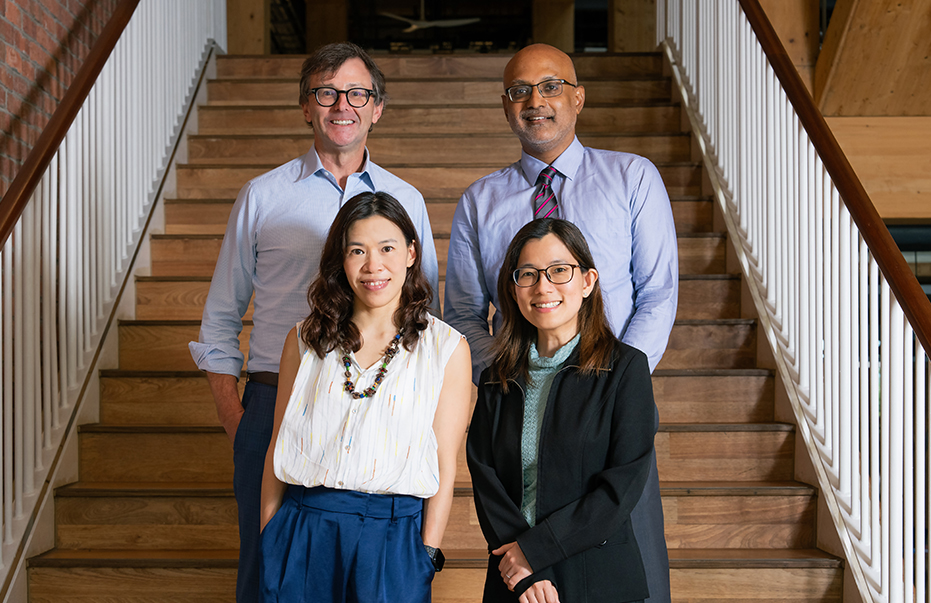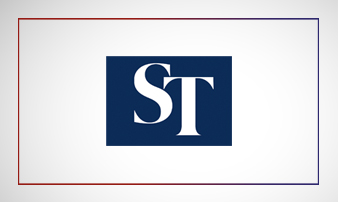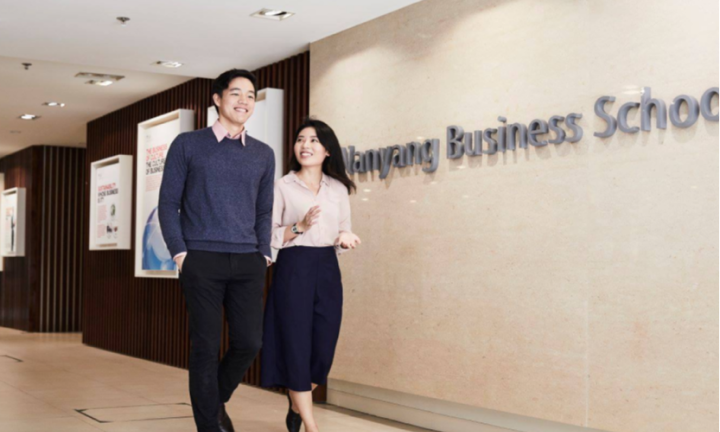Welcome to Nanyang Business School
Get to know usConsistently ranked among the world’s best business schools, we are one of the most established, comprehensive providers of business and management education in the Asia-Pacific region.
A premier business school within a leading technological university, Nanyang Business School (NBS) is the nexus of world-class innovation, research, and business education. At NBS, we innovate through interdisciplinarity, lead with cultural dexterity, and transform for sustainability.

Message from the Dean
Here at Nanyang Business School, we draw on the strengths of being fully integrated into a world-class technological university, to develop adaptable, future-ready leaders for today’s fast-changing business world.
Our internationally recognised faculty excel in both research and teaching, bringing global perspectives and regional expertise to bear on the ASEAN business environment and beyond.
With this mindset, we have designed an interdisciplinary curriculum that combines cutting-edge research and technological innovation with industry-relevant business insights. Our curriculum fosters entrepreneurial drive while maintaining a strong focus on sustainability. Both our undergraduate and postgraduate programmes offer customisable learning paths with ample opportunities to hone leadership skills, nurture cultural intelligence, and gain real-world experience.
Students can also benefit from global exposure through industry collaborations, local and overseas internships, and exchange programmes with top schools. We are excited to introduce field-specific workshops to impart specialised skills. NBS also offers a wide range of continuing education programmes, curated to help middle and senior-level professionals stay proficient with new technologies, remain relevant in the workforce, and grow as leaders.
In recognition of the excellence of our programmes, NBS has received accreditation from the Association to Advance Collegiate Schools of Business (AACSB) and European Quality Improvement System (EQUIS) — the world’s most widely recognised quality assurance standards for accounting and business education.
As such, we are immensely proud of all who carry the mark of an NBS education. Our alumni network is more than 65,000 strong worldwide. Not only are they making a significant impact in business and society, they also continue an active engagement with NBS, providing mentoring guidance, internships, and career opportunities for NBS students, as well as connecting NBS with other institutions, industry, and government. NBS remains committed to pursuing alumni contributions and strategic collaborations with partner organisations in ASEAN and beyond. By providing valuable professional development and industry-relevant exposure, these opportunities not only enhance student employability but also empower individuals and businesses to bring about lasting change, for the better.
Ultimately, we at NBS stand ready to innovate through interdisciplinarity, lead with cultural dexterity, and transform for sustainability. We look forward to having you join us.
Prof Jun Yang
Dean, College of Business
(Nanyang Business School)
President's Chair in Finance
Innovate. Lead. Transform.
A premier business school within a leading technological university, Nanyang Business School (NBS) is the nexus of world-class innovation, research, and business education. At NBS, we innovate through interdisciplinarity, lead with cultural dexterity, and transform for sustainability.
Innovate through interdisciplinarity

Our collaborative approach is integrated into our programmes, research, and partnerships, allowing us to effectively tackle business and societal challenges such as urban sustainability, supply chain resilience, healthcare, and ageing. Through interdisciplinary learning, we offer learners unparalleled opportunities to innovate, preparing them to thrive in today's dynamic landscape.
Lead with cultural dexterity

Transform for sustainability

Bringing together NTU Singapore's strengths in science and technology with NBS's leadership expertise, we nurture ethical, entrepreneurial leaders to address the broader issues in business, society, and the environment. Our programmes shape leaders with a purpose, guiding them to think beyond conventional boundaries. These leaders pioneer new paths, create value beyond just business outcomes, and bring about meaningful change where it matters most. Advocating both success and ethical behaviour, they lead a journey towards sustainability.
Innovative, rigorous, and relevant programmes
Nanyang Business School graduates are highly sought after by the world’s top employers for their ability to think analytically and creatively. They show initiative, can work collaboratively or autonomously, and have a forward-thinking, international perspective.
Our students are immersed in a curriculum focused on team-based projects, presentations, business simulations, case studies, and industry-based projects.
Research
Find out more
Our 12 research centres bring together leading academics and industry experts to develop cutting-edge research that is impactful and relevant to latest industry needs.
NBS Knowledge Lab
Find out moreThe NBS Knowledge Lab is a platform where we share management insights and the latest business thinking. Showcasing expert opinions from our faculty, industry partners, and experts from around the world, NBS Knowledge Lab keeps you up-to-date with latest market trends, research topics, and market insights.
Events & Webinars
View moreAcademic Divisions
Find out moreOur world-class faculty, organised into seven academic divisions, are well regarded for their strong academic qualifications, first-rate teaching skills, and rich industry experience across a diverse range of disciplines.

NBS Alumni
Read more about NBS alumni
Discover the lifelong benefits of being part of our global alumni community – your gateway to continuous learning, career resources, and meaningful connections made through networking and giving back.


The Carbon Markets Academy of Singapore
The Carbon Markets Academy of Singapore (CMAS) aims to be Asia’s leading academy for carbon management education, aligning with Singapore’s vision of becoming a Carbon Services and Trading Hub for Southeast Asia and the Asia Pacific. By partnering with NTU’s various entities and industry leaders, CMAS delivers a multidisciplinary programme that brings together diverse perspectives from both academia and the industry.
Find out more.jpg?sfvrsn=2f430f22_4)
NBS Giving
Philanthropic support enables NBS to advance as one of the world’s most impactful business schools. However you choose to give, we invite you to partner with us and make a meaningful difference to our students, our research, and our collective future.
Together, we can tackle the most pressing issues of today and continue inspiring the leaders of tomorrow.

Social Responsibility
Nanyang Business School promotes and conducts activities on social enterprise and social responsibility, as part of our mission to develop leaders for a more sustainable world.
Find out more about our initiativesNews
Read allInsurance firms looking at tailored solutions for consumers amid growth in embedded products
Insurance companies are increasingly looking at customisable solutions amid the rise in popularity of embedded insurance, which are products customers secure as protection for specific transactions.
One example would be AppleCare, where customers can opt to pay an additional premium in order to get coverage for the products they are purchasing.
A survey by embedded insurance company Cover Genius conducted in 2021 showed that 83 per cent of Singaporean digital bank customers would be highly interested in receiving embedded insurance offers based on their transaction data, with 58 per cent citing "convenience" as the primary driver for their interest.
The firm offers protection for consumers of digital companies such as Turkish Airlines, Ryanair and Booking Holdings, which owns brands like Booking.com.
Dr Shinichi Kamiya, associate professor in the division of banking and finance at Nanyang Business School at Nanyang Technological University, said embedded insurance adopts a targeted distribution approach and leverages existing distribution channels such as e-commerce platforms.
Functionally, it works the same way as traditional insurance, where a partner company collects insurance premiums and transfers it to insurers for future claims.
Cover Genius said they noticed that there was a gap in the insurance sector over the pandemic.
"During the pandemic, many players in the traditional insurance industry were unable to tailor their products to consumers and it was difficult to purchase with confidence," said Mr Chris Bayley, co-founder and chief customer solutions officer at Cover Genius.
"As a result, more flexible products such as embedded insurance emerged at that time and this has been sustained and evolved post-pandemic to be much more customer-centric."
However, Dr Kamiya said that embedded insurance needs to be delivered elegantly especially if a customer is not expecting to be offered insurance for a product they are purchasing, but is offered anyway.
"It can decrease the perceived value of those offerings by insurance marketing, especially if customers experience unexpected purchases of insurance," he noted.
Additionally, he pointed out that embedded insurance could be risky, as customers may not be able to make informed decisions due to the lack of information provided by embedded insurance platforms.
He said: "Platforms may not provide full information about a policy and customers may not have time to fully understand coverage and review their policies which may overlap with the embedded insurance.
"Therefore, customers may buy embedded insurance without adequate consideration."
He said companies need to also ensure customer data privacy.
"Embedding insurance at the point of need relies on the collection and analysis of customer data, which are also used to determine coverage and pricing.
"Since platforms are technically able to increase customer demand and maximise price, the ethical use of this data is paramount.
"Insurance companies should clearly communicate how customer data will be collected, stored, and used for insurance purposes," he said.
Dr Kamiya also noted how most traditional insurance companies were not implementing embedded insurance options at the moment.
"Embedded insurance will not be a major source of revenue for traditional insurance companies. The market for embedded insurance may be too small for them to commit at this point.
"And the costs associated with embedded insurance (for example, collaborating with business partners) is not negligible. However, different types of embedded insurance will emerge and gradually shift the insurance ecosystem," he said.
Income Insurance is taking another approach with embedded insurance, by looking at how it can close protection gaps of underserved individuals who may not have access to basic insurance.
This has led to a micro-insurance and investment proposition, where users could build insurance coverage by contributing micro-premiums each time they complete a lifestyle activity such as taking public transport or dining out.
Chief digital officer at Income Insurance Peter Tay told ST: "Over time, users can stack insurance coverage to build up their own portfolio and have the flexibility to stop and start coverage any time."
Dr Khoo Kah Siang, chief executive officer of Manulife Singapore, said embedded insurance is a response to consumer preferences for simplicity, transparency, and convenience.
"By embedding insurance at relevant touchpoints, consumers are offered contextual, easy-to-understand and simple-to-purchase solutions precisely when they need them," he said, adding that embedded insurance will become more customisable and convenient in the future.
Dr Kamiya said the future of insurance will rely heavily on data-driven decision-making, which will enable insurers to refine underwriting processes, pricing models, and risk management strategies.
"Advanced analytics and artificial intelligence will play a crucial role in leveraging this data for product innovation and enhanced risk assessment," he added.
Source: The Straits Times
- Business
- Education





.jpg?sfvrsn=71d63a84_0)



.png?sfvrsn=7b7f46c0_2)

















